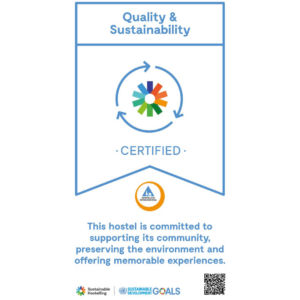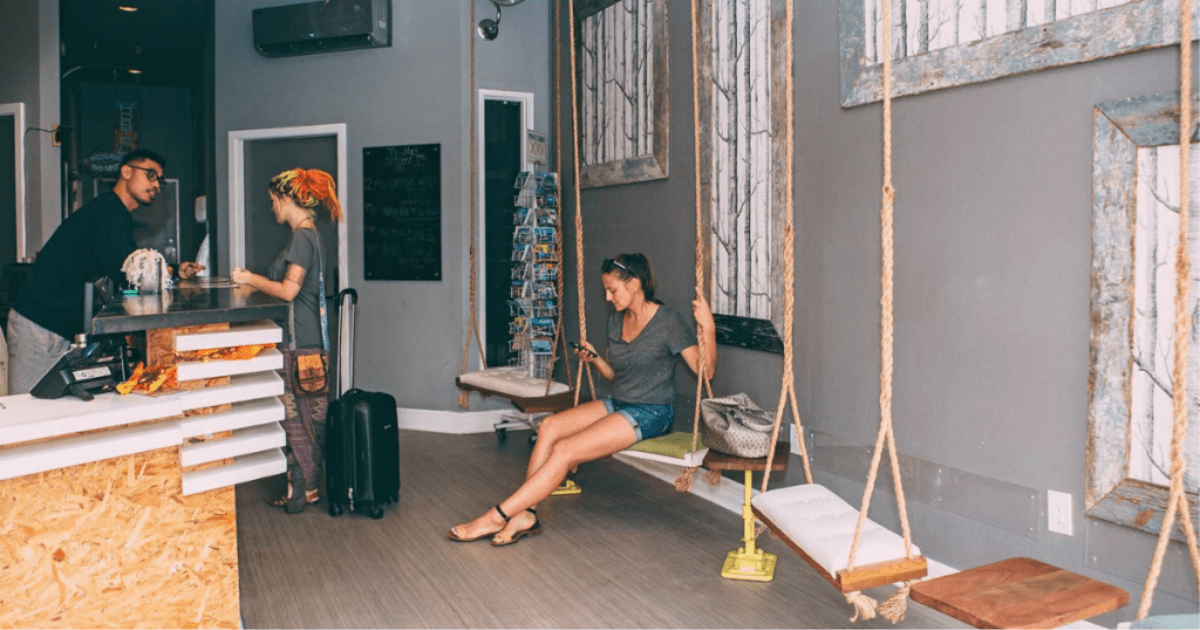
At HI we know that without our love and care today, there will be no world for us to enjoy and discover tomorrow, which is why we believe in Sustainable Hostelling for a better world. While some of the topics around sustainability and climate change can seem daunting or overwhelming, making small changes and sustainable choices can have a big impact. Here are some of our top tips to travel better, help preserve, and even help restore the environments we travel through for generations of future travellers.
Reducing your Footprint
Instead of flight shaming, it is time to start looking for ways to keep our carbon footprint to a minimum, and if that guilt creeps in, mitigate it!
Remember, lighter bags means lighter planes which lead to less fuel use. Book with airlines that recycle the waste created from food and beverages and that offset their CO2 emission. Choose sustainable providers – regardless of the means of travel, look for providers that care about the environment and make an effort to reduce their carbon footprint.


We work with our partner myclimate to allow you to offset your stay and contribute to our HI Sustainability fund. Carbon offsetting can be a great way to compensate for the emissions we produce, however, it is worth noting this alone will not solve the issues around the changing climate.
Leave the car behind, if only for a day, and walk, cycle or use public transport to get around. You’ll see a lot more and it’s cheaper! Trains are also a great alternative and provide the backbone for some great adventures by rail. If you want to find out more about public transport options your hostel will be happy to assist.
Keep your eye out for our HI Q&S label hostels! These hostels are certified through the HI Quality & Sustainability Management System, recognised by the Global Sustainable Tourism Council. and are guaranteed to actively work towards sustainability.
Remember there are lots of low-carbon activities such as trekking, mountain biking, horse riding, kayaking, rafting, caving, snorkelling, swimming, concerts, theatre trips and language and cooking courses.
Discover the Hostel Experience
HI hostels are hubs of inter-cultural exchange and learning. Hang out in the hostel’s open spaces and spark up a conversation with other guests or chat with hostel staff to find out more about the locale.

We always recommend learning a bit about your intended destination before your trip. If the language is different to your own, learn a few words, and you’ll be an instant hit with the locals for your attempts. Connecting with others can provide a unique aspect to your trip and may even lead to unexpected adventures.

Your trip offers the opportunity to explore a new culture and to see the world from a different perspective. Remember that eating local foods, shopping in local markets and attending local festivals are all part of experiencing the culture.
Think Local
Whether it’s the food you buy or businesses you support, by choosing local products you are directly supporting the local community. Thinking local can also go beyond your purchases. If you’re looking to step outside your comfort -zone and really get involved check to see if there are any local volunteering options available.

This can be a fantastic way to meet new people during your trip and to give back to the community you are visiting. If this is something you are interested in, check with the hostel reception to see if there are any activities already planned during your stay. Enquiring about community funds to support local projects is another great, and less hands on way to help.

Do a bit of research before your trip to avoid culture shock. Make sure you dress appropriately when advised, for example at sacred sites, and always get permission before taking photos of anyone.
Reduce, Reuse, Recycle
Be mindful about your purchases and try to avoid overly packaged goods. Say no to plastic bags if you can, and use a reusable bag instead. Carry a water bottle and/or coffee mug and try to avoid, where possible, purchasing plastic bottles or disposable coffee cups. Put clean, squashed aluminium cans, glass, paper, cardboard and batteries in the correct bins. If in a remote location consider taking items that are not recyclable locally but are recycled in urban areas with you i.e. plastic and tetra packs.

Consider food waste, dining in is usually a better option, fast food, in particular, creates an enormous amount of waste.
Use rechargeable gadgets: batteries, cameras etc. Instead of purchasing small containers of shampoo, take reusable ones. Take only the brochures and maps you will use and return the others to the brochure stand or leave them in the room so they can be reused or recycled.
Many hostels have areas where you can leave or swap books, clothes and travel necessities. If you don’t need the rest of your toiletries, books or anything else when packing to go home, leave them with the hostel for other guests to use.

Ask the hostel if anything is unclear about their waste management.
Be resource-conscious
Being mindful about our impact may seem overwhelming but just a few changes in habit can make a big difference. Easy ways to reduce your energy load include switching off lights and air-con when you leave the room, turning down heaters that are not needed, closing doors and windows if the heating or air-con is on and avoiding leaving appliances on standby. Unplug appliances, such as TVs, as they can use energy even when they’re turned off.

Be water-wise and remember to turn off the tap! Access to clean, safe, drinking water is a basic human right, however, in countries where water is ubiquitous, it is easy to take for granted and forget what goes into making our water safe and potable. You can help preserve this key resource by turning off the tap when brushing your teeth or shaving, sharing dishwater with others, using the double flush in toilets and taking shorter showers. Bring your own towel and only wash it when necessary.
If you’re in unspoiled natural environments, embrace the wild look, you don’t need to wash your hair or shave every day.
Respect Wildlife
Part of the excitement of travelling to a new environment is witnessing the difference in habitats and wildlife. It is important to note, however, that we should be observers only, and aim to have as little impact as possible on native habitat and species, leave no trace and only take photos if permitted and safe to do so.
If using a tour guide make sure they are sustainable and have the animals’ interests as their number one priority. Never ride on wild animals, and avoid animal entertainment, the animals kept for these shows are more often than not very poorly and even cruely treated.

Avoid buying products made from endangered species and threatened natural resources, and report poaching and other illegal activities to the local authorities.
Check out local conservation agencies as they will have the best information available and will be able to point you in the right direction if you have any doubts.
Advocate
There is only one Planet Earth and we all have a responsibility and a role to play in ensuring its health and sustainability for future generations. Think about the choices you are making, from providers you are choosing to those simple changes in habit that can make a big difference.

Thank suppliers for their green measures, or don’t be afraid to ask why they don’t have a green programme. As a paying customer, you can make a huge impact on companies’ policies.
We are all in this together, and together we can make a difference.
If you would like to help us contribute towards a sustainable future
All donations go directly towards funding our global initiatives and sustainable projects throughout the HI network